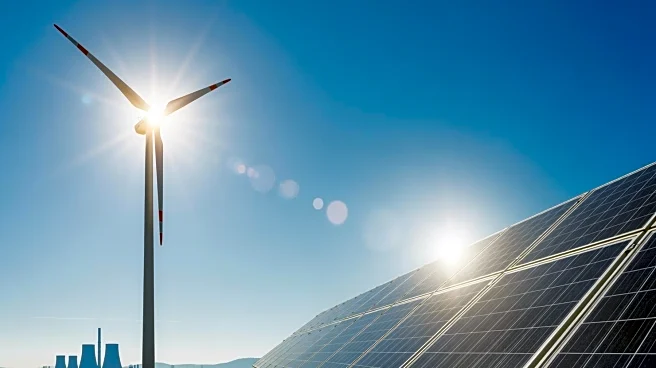What's Happening?
The global energy landscape is witnessing a significant shift as renewables have overtaken coal as the top source of electricity for the first time in 2025. This milestone marks a pivotal moment in the fight
against climate change, with countries around the world rapidly increasing their renewable energy capacity. The International Energy Agency projects that global renewable power capacity will double over the next five years, adding 4,600 gigawatts, equivalent to the total power generating capacity of China, the European Union, and Japan combined. Despite this progress, experts caution that the transition to clean energy is not yet inevitable, as fossil fuel production continues to rise in many regions.
Why It's Important?
The surge in renewable energy is crucial for reducing global emissions and combating climate change. As the energy sector is the largest source of emissions, transitioning to clean electricity is essential for decarbonizing transportation and other industries. The economic benefits of renewables, particularly low-cost solar, are driving this shift, making clean energy more accessible and affordable. However, the continued reliance on fossil fuels in major polluting countries like China and the United States poses challenges to achieving global climate goals. The rapid growth in energy demand means that renewables must expand even faster to offset emissions from fossil fuels.
What's Next?
Countries must focus on integrating intermittent renewables with energy storage solutions to ensure a stable and reliable power supply. The development of battery technology and infrastructure will be critical in supporting the clean energy transition. Additionally, policy measures and incentives will play a vital role in encouraging further investment in renewables. As emerging economies continue to grow, they have the opportunity to leapfrog into a new energy era, bypassing traditional fossil fuel infrastructure. The global community must collaborate to support these efforts and accelerate the transition to a sustainable energy future.
Beyond the Headlines
The clean energy transition has broader implications for global geopolitics and economic development. As countries invest in renewables, they may reduce their dependence on fossil fuel imports, altering trade dynamics and energy security. The shift also presents opportunities for technological innovation and job creation in the renewable energy sector. However, the transition must be managed carefully to avoid economic disruptions and ensure equitable access to clean energy resources. The ethical considerations of balancing economic growth with environmental sustainability will continue to shape policy decisions and international cooperation.










